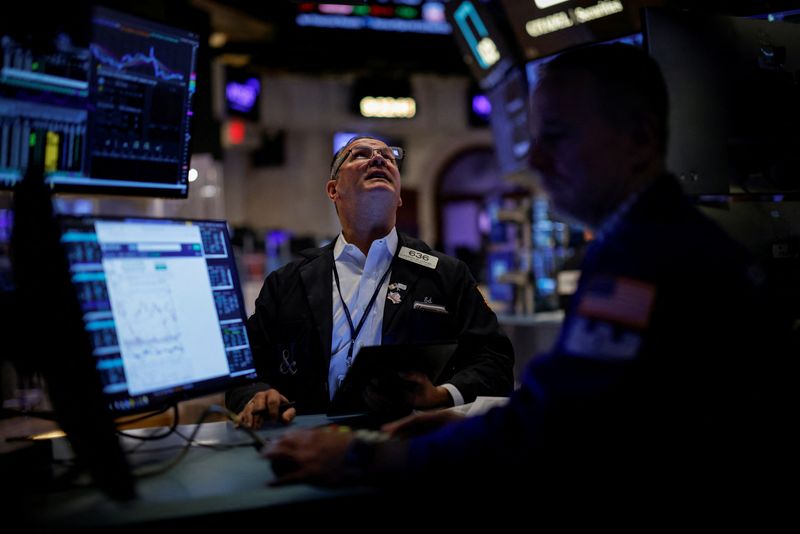By David French
(Reuters) -The Dow Jones Industrial Average advanced on Thursday to its fourth record close in the last five sessions, as stronger-than-expected monthly retail sales indicated a robust U.S. consumer and TSMC's upbeat forecast buoyed chipmakers' stocks.
The other main Wall Street benchmarks were largely unchanged, as the S&P 500 dipped to a fractional loss and the Nasdaq Composite eked out a tiny win.
Taiwan Semiconductor Manufacturing Co, the world's largest contract chipmaker, beat market estimates for profit and forecast a jump in fourth-quarter revenue, driven by demand for artificial intelligence chips.
The chipmaker's U.S.-listed shares soared 9.8%, while artificial intelligence-trade favorite and TSMC customer Nvidia (NASDAQ:NVDA) gained 0.9%.
The optimism spread to other chip stocks, sending the broader Philadelphia SE Semiconductor index 1% higher.
Fresh U.S. data confirmed healthy growth in the world's largest economy, while keeping bets on a 25-basis-point rate cut at the Federal Reserve's next meeting largely intact at 89.4%, according to CME's FedWatch.
U.S. retail sales increased 0.4% in September, slightly more than expected, while weekly jobless claims fell unexpectedly.
A broadly upbeat start to the third-quarter earnings season, strong economic data and the Fed kicking off its policy-easing cycle have pushed the Dow and the S&P 500 to record highs in recent sessions, with the latter close to the psychologically important 6,000 mark.
The S&P 500 lost 1.00 points, or 0.02%, at 5,841.47 points, while the Nasdaq Composite climbed 6.53 points, or 0.04%, to 18,373.61. The Dow Jones Industrial Average rose 161.35 points, or 0.37%, to 43,239.05.
Josh Jamner, investment strategy analyst at ClearBridge Investments, said investors have been revising economic and earnings growth expectations as robust data eased worries about a recession.
However, investors were trying to figure out which companies and sectors will lead the market higher, and when to rotate into them, after months of megacap stocks driving market rallies.
"Overall, it's allowing the market to advance, but maybe in a somewhat more restrained fashion than what otherwise might be expected," Jamner said.
While the Dow advanced for the second straight day, small cap indexes fell. The Russell 2000 dipped 0.3% and the S&P Small Cap 600 slipped 0.2%, a day after closing at their highest in nearly three years.
A majority of S&P 500 sectors were also weaker, including rate-sensitive indexes such as utilities and real estate <.SPLRCR>, which slipped 0.9% and 0.7%, respectively.
One other quirk is that U.S. equity benchmarks have advanced in recent days even as U.S. Treasury yields have crept up. On Thursday, the benchmark 10-year note yield rose 7.5 basis points to 4.091%.
In earnings-related moves, Travelers Companies (NYSE:TRV) and Blackstone Group (NYSE:BX) advanced 9% and 6.3%, respectively, to record closing highs after both the insurer and the money manager posted third-quarter profit which beat market expectations.
The S&P Banks index edged up 0.1%, advancing for a fifth straight session, matching its mid-August run and just one off its six successive wins in April, as a slew of larger regional banks posted third-quarter numbers. M&T Bank (NYSE:MTB) and Synovus (NYSE:SNV) Financial rose more than 5%, but Truist Financial (NYSE:TFC) dropped 3.5% and Huntington Bancshares (O:HBAN) slipped 2.6%.

Outside financials, health insurer Elevance Health plummeted 10.6%, its biggest one-day drop since the start of the pandemic in March 2020, after slashing its full-year profit forecast.
Volume on U.S. exchanges was 11.34 billion shares, compared with the 12.08 billion average for the full session over the last 20 trading days.